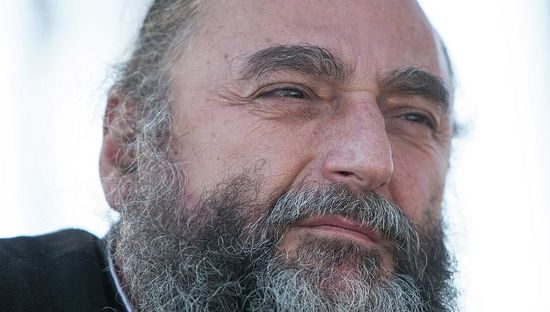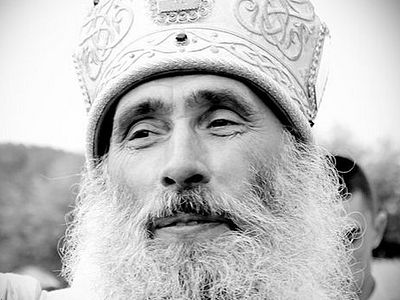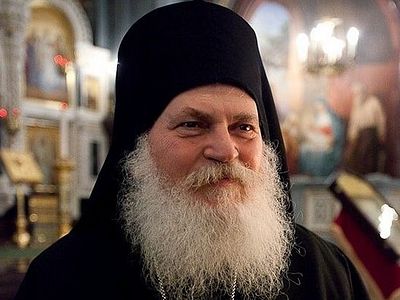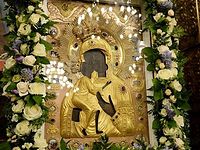Many people in the U.S. have met the remarkable Georgian hierarch, Metropolitan Nikoloz. He has made a number of charity visits to various U.S. cities, given talks and presentations of his own films, and in turn received pilgrims in his own Georgian diocese. His missionary work comes straight from the heart, as the many people who were baptized on his missionary trips can testify.
Can a physicist believe in God, how should a modern cinematographer be, why does the Lord allow wars and persecutions against Christians, and what experience can Georgia share with Russia and the Ukraine are questions discussed in an interview by RIA Novosti with this multi-talented hierarch of the Georgian Orthodox Church, Metropolitan Nikoloz (Pachuashvili) of Akhalkalaki and Kumurdo.
—The events in the Ukraine are provoking an active response in world society. The Church, caught in the conflict between two states, also has its own relationship to the tragedy. Even families are breaking apart by differing political views—people living in the Ukraine have broken communications with relatives in Russia…
—I can call what is happening in the Ukraine by only one name: a fratricidal war. We also experienced and experience its weight—both on the level of an international conflict and political processes, and on the level of common, everyday manifestations. It still happens in our society that the members of a family have differing political convictions and therefore relate to each other with tension, mistrust—almost enmity. Unfortunately, this is a common human tragedy. But the greatest problem consists in the fact that people do not have enough faith. It would be correct to look at everything that is happening from the standpoint of our religious confession.
I can say that the more a person understands the sources of his faith, the less aggressive he will be toward another person. In associating with Georgians, Russians, Abkhazis, or Ossetians I have always related to them as to Christians, even if they were not Christians. After all, regardless of their faith, if people find a religious motivation within themselves, if they will more often turn to their religious roots, a solution to the conflicts will most likely be found without the need for bloodshed.
—But there have never been so many schismatic organizations in Georgia as there are in the Ukraine. Now members of the so-called Kiev Patriarchate and the Greek Catholics are trying to put in their political two cents, and the country’s government is supporting them. How should schismatics be dealt with?
—Schismatics are people who have different demands and arguments, and they always go after their aims. I am sure that we have to battle not so much against schismatics as for our own faith. Therefore I call upon Christians first of all to be more Orthodox. Then the Lord will protect them from “all enemies” and show the right way out of the conflict.
The main problem is the non-religiousness of a great majority of modern people. This is what causes schisms, and the reason for these schisms is first of all pride. After all, according to the explanations of the holy fathers—in part, St. Igatius (Brianchaninov)— schism and heresy are “sins of the mind”. And just as any sin corresponds to some inner sensual inclination, so do schism and heresy correspond to hardness of heart. It is best to approach this problem precisely from this angle. If we want to influence a schismatic, we should by no means relate to him with aggression but only with Christian love. If we Orthodox will have this Christian love and if we are sure in our confession of faith, then any conflict can be quelled.
In general, what is happening today in the Ukraine is a tragedy for all reasonable people. Only very recently I was on Mt. Athos and served Divine Liturgy with Metropolitan Anthony, the director of affairs of the Ukrainian Orthodox Church. We dedicated our concelebration to the support of Orthodox Christians. I make no distinction between Russian, Georgian, or Ukrainian Orthodox. We are all Christians.
That there are attacks on churches now in the Ukraine, that they are seizing churches—all of this is a manifestation of something that bears absolutely no religious character. Of course, in Georgia we are continually praying for Christians in the Ukraine; we support them, and watch with great anxiety after the fate of the priests who have to fulfill their duties and perform their service under such complicated conditions. This is all very close to home for us: In 1993 we experienced almost the same thing. In Abhazia, in the village of Comana, where St. Basilisk was martyred (fourth century) and St. John Chrysostom was buried (fifth century—Ed.), Hieromonk Andrei was shot (Kurashvili—Ed.)—a man who never took a firearm in his hands. He was killed only because he was a representative of the Georgian Orthodox Church.
—You spoke of hardened hearts. This year we celebrated the 70th anniversary of the victory in the Great Patriotic War (WWII—Trans.) But not even a century has passed since that world war and world society is already willing to start a new one. What could this be—short human memory span, political ambitions, or the deadening of moral and spiritual qualities? In your view, why have people so quickly forgotten the horrors of the Second World War?
—It seems to me that you don’t need a century to pass for a new war to begin. In 1945, when Victory Day arrived, I am convinced that there were people who sincerely regretted that the war was over. There were also those who were ready to continue military actions, because it was advantageous to them. And after the Second World War, the world did not heave a sigh of relief: Even during the days that military actions were ending and the peace treaties were being written, new alliances were forming for the perpetuation of war. Even now in the world there are local wars and military conflicts. Those who start wars are seeking their own greedy interests, and this is first of all love of money and human pride. What can be done about this?
The human soul has only one doctor—the Lord has to humble these people, as He humbled all of us on the eve of the end of World War II. On May 6, 1945 the feast of Great Martyr George fell on the same day as Pascha, and on this very day Germany began its negotiations for capitulation. This coincidence, for those who have ears to hear, obviously confirms God’s Providence throughout all the joyful events of those days and disperses all doubts concerning the question of historical mistakes and the end of the war. The Lord shows us directly where the historical truth was in these events: the German act of capitulation was signed by “Marshal Victory” with the name of George!
We would do well to continually remember that how our enemy is not a man and not a politician. There is one common enemy, who will always want only evil for people, and this enemy will manifest himself in various ways, including wars. But the Lord guards and protects us. And if a person can guard himself from evil people, he can be protected from an evil spirit only with God’s help. Therefore we hope in the Lord and pray. And the solution for all of us lies in praying together.
—You were born in Tbilisi during the time when faith was persecuted in the militant atheist USSR. How important was religion to your family, how did the Church preserve the faith of its forebears, and was it passed on as an inheritance?
—I was born in a family that had no clergymen and no living tradition of religiosity. Nevertheless, that today over 95 percent of the Georgian population considers Orthodoxy its religion means that faith during the years of persecution was in fact preserved in the deeper layers of human consciousness and culture of our people. For example, when I was a child we dyed eggs every Pascha. And every child was baptized without fail. I, for example, was baptized in infancy, which was perfectly natural, despite the prohibitions and persecutions. These traditions were preserved in our people. This is precisely why I very easily made the decision to enter the life of the Church at the first opportunity.
—Does this mean that there weren’t such wide-scale persecutions against religion, faith, the Church, and the priests in Georgia as there were in Russia?
—The Georgian Church was in a very difficult position. Bolsheviks and theomachists wanted to completely destroy Orthodoxy in Georgia. Now, of course, the situation has normalized, but it is not possible to produce any statistics. I have heard that in Russia there are statistical data showing that nearly every day at least one new church is opened on the country’s territory. There are no such official numbers in Georgia, but churches are being built, priests are being ordained, and there are now already thousands of them. One could say that their number has reached prerevolutionary levels.
—You came to the Church after graduating from the physics department of Moscow State University. Why did you choose this field?
—From my very childhood I always had a thirst for knowledge and was interested in nature and its laws. Because physics is a science of nature, I spent much time studying it from grade school. I even attended a physics and mathematics school. True, I thought for a long time about what university to enter because I had many different interests, such as language and linguistics, or mathematics as an abstract form of thinking. But in the end I gave preference to physics. At first I entered the University of Tbilisi, and later, in the third year, I transferred to MSU. It was possible to do so at the time—students were sent to study in various cities in the USSR according to their field. I graduated from the MSU physics department in 1985
—What motivated you, a graduate in natural sciences, far from all issues of spirituality or religious understanding of the world, not only to come to church but also to stay there? After all, the stereotype is that most natural scientists are atheists.
—This is actually a false stereotype. It is enough to read the biographies of all the great physicists—you will rarely find an atheist among them. Newton was a famous theologian. And Blaise Pascal or Albert Einstein? They all believed in God. Therefore there is nothing unnatural when a person who is inclined towards hard sciences comes to faith in God. Even Johannes Kepler said as he observed the heavenly bodies that if he weren’t a believer, he would have nevertheless come on his own to the thought that there is one author of this entire order. Physics is the observation of nature; and if we delve into it and look at it more carefully, we can always see the footprints of divine creation.
—Have you seen, personally, these footprints in your scientific activities?
—As it happened I did not become a scientist. During my studies in the university I became interested in other things besides physics. Possibly this to some degree set the stage for my continuing education in the theatrical institute after graduating from the physic department. It seemed to me that communicating with people was more important at that time, when the social service of the Church was just beginning to develop. Science—in any case as I imagined it—presupposed isolation and concentration. I still consider scientific activities and natural sciences interesting, but I can’t allow myself to pursue it, because I feel a greater need for direct service to people. Therefore I can’t tell you anything about my academic experience and my meeting with God in it.
I would most likely draw a conviction of the existence of a Creator from the scientific standpoint only theoretically. And it would sound like this: In both physics and mathematics there is the concept of “closed space”. This is a specific scientific concept. The material world, our Universe, can be imagined as a closed material system, and there is seemingly no space for an immaterial God in it. But mathematicians have proven that in any closed space there exists a position that does not proceed from the axiom of this space and yet does not contradict it. In our case this means that the existence of God does not proceed from the laws of the material world, and yet it does not contradict them.
—You also studied at the department of animation in the Tbilisi Shota Rustaveli State Institute of Cinematography. Why did you choose this very department; what about animation attracted you and still attracts you? Have you created any cartoons?
—In my understanding, animation and cartoons are slightly different concepts. Cartoons are what they call a specific type of animated film, mostly aimed at children. But the word “animation” implies “bringing to life”. I was deeply interested in animation precisely because practically all film, in my view, is animation. After all, if you look at film tapes, they all consist of still pictures that only come into motion when they are looked at quickly, one after another. Only the principles of creating the image differ: the pictures are either drawn, or photographed. This is film.
The art of film, like literature, creates images. After all, the Lord Jesus Christ gave us the first example of the creation of such images. He told stories that at times had no basis in real history, but these very stories became the first works of Christian art. It seems to me that all art, especially film and in part animation, is the creation of images and parables. Therefore for me every film is a sort of parable.
—You are often in Russia and Moscow. What brought you this time to the Russian capital?
—The reason for my visit to Russia this time is to defend my dissertation in the St. Tikhon Orthodox Humanitarian University. The theme of my dissertation is “Missionary aspects in the service of the Prophet Jonah in the patristic exegesis of the ancient Christian Church.”
I chose the theme, of course, not by accident. It was determined by particularities and tasks of my own service. Since 1991, I have been the vice chairman of the missionary department of the Georgian Patriarchate. And the theme of mission, of apostolic work, is fundamental in the Georgian Church, just as it is in the Russian Church; or more exactly, in universal Orthodoxy. Therefore it is very important to have a theoretical platform, naturally, based upon the Holy Scriptures, which should definitely describe and explain the fundamentals and principles of missionary work, including those of the New Testament, which remain relevant to this day. I successfully defended the dissertation.
—Will the dissertation go through the higher [State] attestation committee?
—The St. Tikhon Orthodox Humanitarian University, founded in 1992 with the blessing of Patriarch Alexy II, has as one of its goals the introduction of ecclesiastical disciplines into the state educational standard. This is also a kind of missionary work. The subject of theology is already accepted by the higher attestation committee, but it is not yet considered as an academic degree. However, I hope that it eventually will.
—In Russia for several months now there has been lively discussion surrounding the film by Andrei Zvygintsev, “Leviathan”. Some call it timely and needed, for Orthodoxy among other things, while others, to the contrary, are sure that the producer is acting against the Russian Orthodox Church and the faith. Have you seen this film, and if yes, how to you feel about it?
—Yes, I saw the film. The film’s authors were trying to create the image of a Leviathan, that is, of unconquerable evil, in the unholy alliance of secular and spiritual authorities and to show a certain hopelessness in it. The Leviathan exists—it is the prince of this world. Unfortunately, it is present in real life and manifests itself through real people, but we have to protect ourselves from it correctly. I have several serious complaints against the film “Leviathan”. And the first one is, of course, connected with language norms. What is now acceptably called a non-normative lexicon is in fact foul language, and this, unfortunately, is the sin of many authors. It seems to me that foul language can have nothing in common with art. Any emotion, be it anger, joy, or disappointment, can be expressed in decent literary language. The explanation that it is supposedly a reflection of reality sounds in this case like no more than a justification for inadequate professional capabilities for relating thoughts and evoking in the audience feelings that the film should apparently touch. Non-normative lexicon does not reflect reality; it is only its shadowy portion. After all, there are pictures in which even more negative heroes are quite convincing, although they are able to do without such language. And both the actors and the producers fully convey the meaning of their characters’ events and feelings—perhaps even more forcefully and precisely.
The second complaint I have is on the level of understanding: Why does the artist create this or that image, and what does he want to say or depict with them? It is one thing if the author has a certain real prototype, and another when it is just pure invention. In the latter case we have to understand distinctly what the goal is in doing this. I am referring to the image of a bishop that is presented in the picture.
If this is some form of, “friendly help” in the healing of supposed sickness in the Church, then as I see it, the author did not accomplish this mission at all. Today there are not so many bishops that you could create a general image of one. Therefore the appearance of such a character on the screen immediately makes one want to know who the specific person hidden behind it is. But by pure force of the small number of bishops, one of their representatives, even if he existed, would have been exposed by the Church hierarchy earlier than the author of this film would have been able to do.
And if this is an invented image, then one can’t understand why he’s needed. If a person wants to think about the role of the Church in modern society, to have his say about it, then he should at the very least acquaint himself with clergymen, learn about their service, about the life of the Church, understand why a priest is necessary to society and to the author himself—something that according to my own impressions of the film, the authors failed to do.




